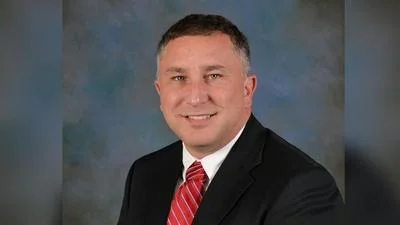State's Attorney Jim Rowe | Kankakee County State's Attorney's Office
State's Attorney Jim Rowe | Kankakee County State's Attorney's Office
Kankakee County State Attorney Jim Rowe is criticizing the reinstatement of the SAFE-T Act’s cashless bail provision known as the Pretrial Fairness Act.
Rowe was instrumental in challenging the law – which is opposed by 100 of 102 state attorneys statewide, 64 of which, including Rowe, challenged the Act in court. Following the ruling, cashless bail can be applied to even the worst crimes such as murder and rape.
"A few moments ago the Illinois Supreme Court ruled that the Safe-T Act is constitutional and will take effect on September 18, 2023. While this ruling is disappointing and the Act terribly detrimental to public safety, we must abide by the decision and will continue to do our best to serve the people of Kankakee County,” Rowe said in a statement. “Despite the defeat, I could not be more proud of all who fought the good fight. The people of Illinois deserve better than bail reform that is passed under cover of darkness at 4 am when the state was sleeping; they deserve to have a voice in any constitutional amendments thru the power of their vote; and they deserve to be governed by a government of, for and by the people - not by legislative or gubernatorial fiat. That was the essence of our lawsuit and we stand for those principles still today.”
In the landmark decision, the Illinois Supreme Court ruled the provision of the SAFE-T Act, which ends cash bail, as constitutional, ABC7 Chicago reported, making Illinois the first state to eliminate cash bail. The 5-2 vote came after a six-month delay caused by legal challenges against the provision. Critics argued that the law restricts judges' discretion in detaining individuals. Courts across the state will have a two-month preparation period before the new bail rules take effect.
Governor J.B. Pritzker donated $2 million to two Illinois Supreme Court justices' campaigns, Mary O'Brien and Elizabeth Rochford, despite a law capping campaign contribution limits at $500,000, according to The Heartlander. Both justices voted in favor of reinstating cashless bail in the SAFE-T Act. Critics have expressed concerns about potential conflicts of interest and call for oversight and recusal to maintain public trust in the judicial system.
“If we don’t have confidence in the opinions the judicial branch issues then our judicial branch is failing,” Chris Forsyth with the nonpartisan Judicial Integrity Project told The Center Square. “Political donations can lead to issues of judicial integrity and the United States Supreme Court has said so. In some cases, they have found political donations to be so grave that there is a conflict of interest that is impermissible.”
After the Illinois Supreme Court's ruling ending cash bail, Republicans are voicing opposition and calling for a special legislative session to amend the SAFE-T Act. They express concerns that eliminating cash bail could endanger residents, narrow the range of crimes for which judges can detain individuals, and impact funding for police departments, while Democrats support the court's decision. Republican leadership in the General Assembly hopes to address these concerns and make amendments before cash bail ends, which according to KHQA would be on Sept. 18.






 Alerts Sign-up
Alerts Sign-up